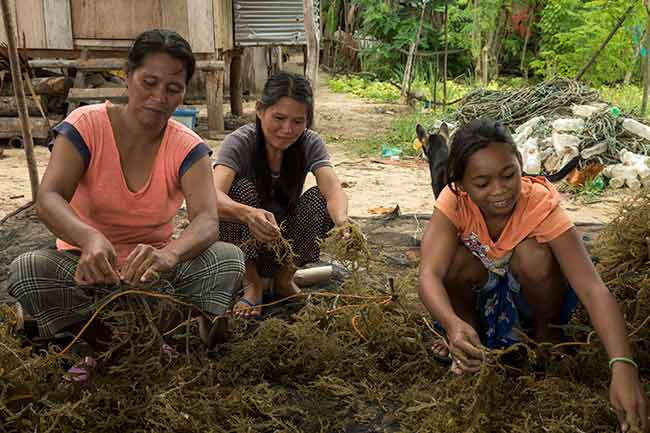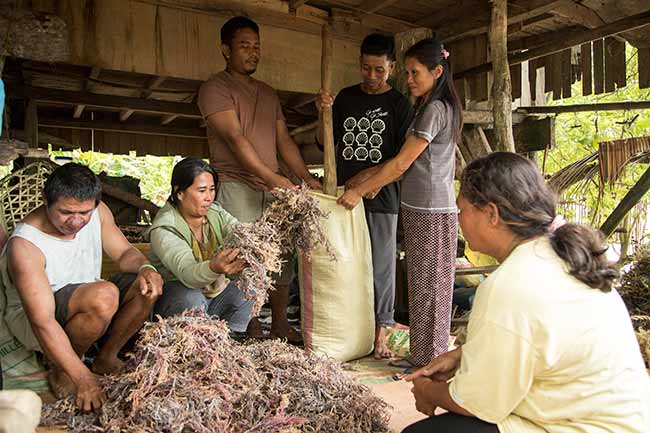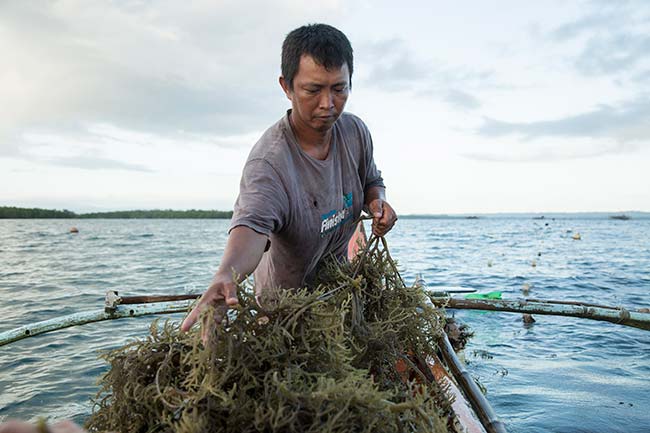This is a global CODESPA privacy policy (the “Privacy Policy”) which applies to the processing of personal data on the following websites: www.fundaciocodespa.org and www.codespa.org including its subdomain https://us.codespa.org. Such websites are dedicated to the work of FUNDACIÓN CODESPA entities, including CODESPA America, Fundació CODESPA Catalunya (collectively “CODESPA”). Please note that each website is controlled by a different CODESPA entity. Therefore, the specific CODESPA entity which will act as a data controller of your personal data will depend on which website you are visiting. This Privacy Policy details which CODESPA entity will act as data controller of your personal data.
Personal data is any information relating to an identified or identifiable natural person by which a person’s identity can be directly or indirectly determined, for example, a name, an email, a phone number or a postal address may be personal data. By providing us with your personal data and using our websites, we understand that you have read and understood the terms related to the personal data protection information set out herein.
I. CONTROLLER OF THE PROCESSING OF YOUR PERSONAL DATA
www.fundaciocodespa.org
Fundació CODESPA Catalunya
This website is owned and operated by Fundació CODESPA Catalunya. Therefore any personal data collected in this website will be controlled and processed in Spain by Fundació CODESPA Catalunya :
WEBSITE’S DATA CONTROLLER
FUNDACIÓ CODESPA CATALUNYA
Tax Identification Number: G-62336011
Address: Carrer Rosselló, 186 -5º 5ª, Barcelona, 08008, SPAIN
Email: barcelona@fundaciocodespa.org
http://www.codespa.org including its subdomain https://us.codespa.org/
FUNDACIÓN CODESPA and CODESPA America
This website and its subdomain are owned and operated by FUNDACIÓN CODESPA and CODESPA America. Therefore any personal data collected by this website and its subdomain will be controlled and processed in Spain by FUNDACIÓN CODESPA and/or in the USA by CODESPA America. Both entities will act as a joint controllers of the collected personal data.
WEBSITE’S DATA CONTROLLER
FUNDACIÓN CODESPA
Tax Identification Number: G-78096187
Address: Calle Rafael Bergamín, 12-Bajo, Madrid, 28043, SPAIN
Email: protecciondatos@codespa.org
WEBSITE’S DATA CONTROLLER
CODESPA AMERICA
Tax Identification Number: 45-5419038
Address: 1050 Connecticut Ave NW Unit 66235 ,Washington DC, 20035, USA
Email: admin@codespa-america.org
You are informed that CODESPA America is located in the USA, a country outside the EU, that does not grant a level of data protection equivalent to that within the EU. By providing personal data through this website to CODESPA America, you acknowledge that this processing is necessary for the purposes set out in this Privacy Policy (for example, online donations may be processed in the USA or online queries may be received and answered from the USA). In addition, note that Fundación CODESPA and CODESPA America have executed the controller to controller standard contractual clauses for the transfer for the personal data pursuant to European Commission Decision 2001/497/EC which are available to you at the following emails: protecciondatos@codespa.org or admin@codespa-america.org.
Throughout this Privacy Policy the terms “CODESPA”, “we”, “our” and other similar terms will refer to the specific CODESPA entity controlling your personal data as detailed above depending on the website you are browsing i.e. Fundación CODESPA and CODESPA America if you are browsing http://www.codespa.org including its subdomain https://us.codespa.org; or Fundació CODESPA Catalunya if you are browsing www.fundaciocodespa.org.
II. MAIN PURPOSES AND LEGAL BASIS OF PROCESSING YOUR PERSONAL DATA
We collect the personal data that you provide to us by our website, by forms or fields to be completed, registration to our newsletter or by email. You will be informed of our Privacy Policy at the time of collection.
The main purposes of processing your personal data and the corresponding legal basis are detailed below:
Data of the candidates
We process this data in order to (i) select your application and (ii) manage your participation in the staff selection processes carried out by the organization.
The legal basis for the processing are the execution of your relationship with CODESPA, complying with legal obligations and CODESPA’s legitimate interest.
Data of volunteers
We process this data in order to (i) select your application and manage your relationship with the organization for the duration of your collaboration; (ii) to maintain, develop and control such relationship; (iii) to manage queries about volunteering; (iv) to keep you informed of our projects and campaigns, as well as (v) to send information on the activities, services and campaigns of the organization, training courses and workshops, invitations to events or publications after the relationship between the two parties has ended.
In the event it is necessary in order to comply with applicable laws, please note that data of volunteers may include personal data relating to past convictions and offences as obliged by applicable laws, for instance, when the volunteering activities involve the regular contact with minors.
The legal basis for the processing are (i) the execution of your relationship with CODESPA, (ii) complying with legal obligations and (iii) CODESPA’s legitimate interest.
Data of partners and donors
We process this data in order to (i) maintain, develop and monitor the relationship that may be established between us; (ii) to inform partners and donors of the organization’s activities, services and campaigns, in particular about our awareness campaigns, our report of activities, publications, courses and training workshops; as well as (iii) to issue invitations to events, the certificates of donations, congratulations and queries on collaboration.
The legal basis for the processing are (i) the execution of your relationship with CODESPA, (ii) complying with legal obligations and (iii) CODESPA’s legitimate interest.
Data of online donations
Users must provide (i) contact information (such as name, email, and shipping address) and (ii)financial information (such as credit card number, expiration date) to make an online donation.
Online donations to FUNDACIÓN CODESPA will be deposited in the Spanish bank account of FUNDACIÓN CODESPA. Online donations to CODESPA AMERICA will be deposited in the bank account of CODESPA America in the USA. CODESPA will allocate the funds to the location (country or region), program, or project where they are most urgently needed.
If you are a Donor browsing http://www.codespa.org including its subdomain http://us.codespa.org and wish to donate to a specific CODESPA location, program, or project may call +1 2024951202 or email us at giving@codespa-america.org. Donors may call CODESPA or email us at giving@codespa-america.org with questions or concerns about donations. Financial and other information about our charity’s purpose, programs and activities can be obtained by contacting Michelle Riestra Esq., Executive Director, 1050 Connecticut Ave NW Unit 66235, Washington, DC 20035, (202)-495-1202.
If you are a Donor browsing http://www.fundaciocodespa.org and wish to donate to a specific CODESPA location, program, or project may call +34 932 000 400 or email us at barcelona@fundaciocodespa.org. Donors may call CODESPA or email us at barcelona@fundaciocodespa.org with questions or concerns about donations. Financial and other information about our charity’s purpose, programs and activities can be obtained by contacting us at Carrer Rosselló, 186 -5º 5ª, Barcelona, 08008, SPAIN.
The legal basis for the processing are (i) the execution of your relationship with CODESPA, (ii) complying with legal obligations and (iii) CODESPA’s legitimate interest.
Data of subscribers
We process this data in order to (i) maintain, develop and control the relationship, as well as (ii) to inform subscribers of the activities, services and campaigns of the organization and (iii) to send them monthly information of the activity of CODESPA and of the impact of our work, and invitations to events and conferences.
The legal basis for the processing are (i) the execution of your relationship with CODESPA, (ii) complying with legal obligations and (iii) CODESPA’s legitimate interest and (iv) your consent. You are informed that the offer of services is based on the consent provided, without the withdrawal of this consent conditioning the performance of the contract or the relationship existing between you and CODESPA.
Data of the students
We process this data in order to (i) maintain, develop and monitor the relationship and (ii) to inform students enrolled in the organization, of training activities, services and campaigns, as well as to (iii) inform them of the impact of our work and send invitations to events and conferences.
The legal basis for the processing are (i) the execution of your relationship with CODESPA, (ii) complying with legal obligations and (iii) CODESPA’s legitimate interest.
Data from images
We process the data obtained from photographs or recordings of the events held by CODESPA, and whose consent will be requested at the time of registration to the event or at that event, in order to use them in our publications, on our website, in the composition of graphic files or graphic videos, that are prepared to inform and/or publicize the activities of CODESPA.
In this regard, participants expressly consent to the processing of their personal data (including their image) and its dissemination in any means or formats, both physical and digital (among others, CODESPA’s websites, social networks, promotional brochures, posters or any other similar advertising means). All Intellectual property rights over such content (including the rights of reproduction, transformation, distribution or public disclosure and by any means or formats such as CODESPA’s websites, social networks or newspapers) are assigned to CODESPA free of charge, for the whole world, for the maximum period permitted by law and with the possibility to assign them to thirds parties.
The legal basis for the processing are (i) CODESPA’s legitimate interest and (ii) your consent.
Data from cookies
By using this Website, you consent to us using ‘cookies’ and similar technologies that can track your activity. Cookies are small pieces of information sent by a web server to a web browser (e.g. Internet Explorer, Safari, Google Chrome or Firefox) on the computer or device you use to access this Website, which enables our server to collect information from your device browser.
Enabling some of these cookies is not strictly necessary for the Website to work but it should enable us to provide you with a better browsing experience. Cookies can be deleted or blocked through changing your web browser settings, however some features of the Website may not work as intended and you may not be able to access parts of the Website. The cookie-related information will not be used for personal identification of individuals and data relating to usage patterns on our Website is kept under our control. These cookies will used for the following purposes:
– to improve Website usability;
– so we can remember your device or computer between successive actions or sessions; and
– to perform anonymous statistical analysis to improve functionality of our Website or any services we offer through the Website.
Please note that when accessing the web and clicking on third party links that may be provided when using our site, those third parties (including, for example, providers of external services that are relevant the Services we offer) may also use cookies on their websites, over which we have no control.
Our Website also makes use of Google Analytics and similar or related analytic products to store information that you send to the server when using the Website. This data includes IP address, pages accessed, and documents uploaded, modified or deleted. For more information about Google Analytics and its privacy practices, please see: https://support.google.com/analytics/topic/2919631?hl=en&ref_topic=1008008.
III. TIME LIMITS FOR CONSERVATION
The personal data provided will be kept and processed to the extent that we need them in order to be able to use them according to the purpose for which they were collected and according to the legal basis for their processing in accordance with applicable law.
We will keep your personal data as long as there is a relationship or as long as you do not exercise your right to delete, cancel and/or limit the processing of your data. In these cases, we will block your data, without giving it any use, as long as it may be necessary for the exercise of or defense from claims or some kind of judicial, legal or contractual responsibility that may derive from its processing, for which recovery is necessary.
IV. RECIPIENTS OF THE DISCLOSURES OF PERSONAL DATA
Personal data will be disclosed when necessary to other national or international offices of CODESPA for internal administrative purposes.
The personal data of students may be transferred to the teachers of the courses in which they enroll or to public or private organizations that collaborate in the courses and to comply with legal obligations.
CODESPA discloses personal data to service providers who may act as data processors. These third parties have access only to the personal data necessary to carry out the service. They are required to keep your personal information confidential and may not use it in any other way than that we have requested.
Online donations will be processed by Stripe Payments Europe, Ltd. (hereinafter “Stripe”). Stripe is an Irish entity regulated by European law, including data privacy laws. It will provide some or all of its processing services from systems located within the United States or other countries outside the European Economic Area. When Stripe transfers personal data to its affiliate, Stripe, Inc. in the US, it employs the European Commission’s Standard Contractual Clauses (“Model Clauses”) to allow for the lawful transfer of such data. You can request a copy the Model Clauses by making a request to:
barcelona@fundaciocodespa.org, if you are browsing www.fundaciocodespa.org; or
protecciondatos@codespa.org and giving@codespa-america.org, if you are browsing www.codespa.org or its subdomains, https://us.codespa.org.
CODESPA, for the purpose of compiling statistics, may provide certain user information in a decoupled manner to third parties.
V. DATA ON MINORS
If the user is a minor, as according to applicable laws, they are required to have the prior consent of their parents or guardians before proceeding to include their personal data in the website forms. CODESPA is exempt from any liability for non-compliance with this requirement.
VI. YOUR RIGHTS WHEN YOU PROVIDE US WITH YOUR PERSONAL DATA
1. What rights do you have in relation to the processing of your data?
• Right to request access to your personal data
• Right to request its rectification or deletion
• Right to request limitation of processing
• Right to object to processing
• Right to data portability
• Right to withdraw consent
Access/rectification and deletion: data subjects have the right to access their personal data, as well as to request the rectification of inaccurate data or, where appropriate, to request their erasure where, among other reasons, the data is no longer necessary for the performance of the contract.
Limitation: in certain circumstances, data subjects may request the limitation of the processing of their data, in which case we will only keep them for the exercise of or defence from claims.
Objection: data subjects may object to the processing of their data. CODESPA will no longer process the data, except for legitimate, compelling reasons, or the exercise of or defence from possible claims, and we will keep them duly blocked for the relevant period while legal obligations remain.
Likewise, data subjects have the right to object to automated individual decision‑making that could produce legal effects or affect them significantly.
Portability : data subjects may request to receive the data that they have provided to us or to request that they be sent to another data controller of their choice, in a structured commonly used and machine‑readable format.
2. When will we respond to your request?
We will respond to your requests as soon as possible and in any case within one month of receipt of your request. This period may be extended up to two months if necessary, taking into account the complexity and number of applications. We will inform you of the extension within one month of the request.
3. Do you have the right to withdraw your consent?
You have the right to withdraw at any time the consent given, without affecting the lawfulness of the processing based on the consent given at the time of the data collection or input.
4. Where should you go to exercise your rights?
For the exercise of their rights, you may send a letter with all your data, including photocopy of ID or passport and indicating the right that is being exercised, addressed to CODESPA:
If your request concerns the data processing carried out by http://www.fundaciocodespa.org you may address CODESPA at this address Carrer Rosselló, 186 -5º 5ª, Barcelona, 08008, SPAIN or via the following email: barcelona@fundaciocodespa.org
If your request concerns the data processing carried out by http://www.codespa.org or its subdomain, https://us.codespa.org you may address CODESPA at this address: Calle Rafael Bergamín, 12-Bajo Madrid 28043 or via the following emails: protecciondatos@codespa.org and giving@codespa-america.org.
5. Do you have the right to claim?
In the event you believe your information is being used inappropriately, you may lodge a complaint with the supervisory authority in your country.
VII. AMENDMENTS TO THIS DATA PROTECTION INFORMATION
CODESPA reserves the right to modify its Privacy Policy in accordance with the applicable legislation at any time. Any changes to this Policy will be posted on the website.
Last update::
1 de October, 2020



